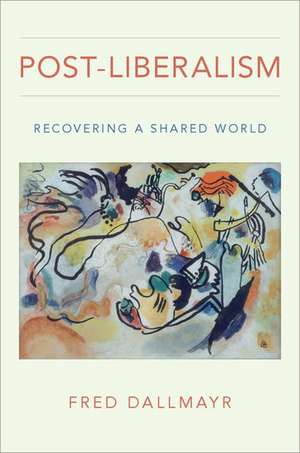Post-Liberalism: Recovering a Shared World
Autor Fred Dallmayren Limba Engleză Hardback – 30 mai 2019
Preț: 349.71 lei
Preț vechi: 428.88 lei
-18% Nou
Puncte Express: 525
Preț estimativ în valută:
66.92€ • 69.45$ • 55.94£
66.92€ • 69.45$ • 55.94£
Carte disponibilă
Livrare economică 12-18 februarie
Preluare comenzi: 021 569.72.76
Specificații
ISBN-13: 9780190949907
ISBN-10: 0190949902
Pagini: 240
Dimensiuni: 211 x 147 x 25 mm
Greutate: 0.39 kg
Editura: Oxford University Press
Colecția OUP USA
Locul publicării:New York, United States
ISBN-10: 0190949902
Pagini: 240
Dimensiuni: 211 x 147 x 25 mm
Greutate: 0.39 kg
Editura: Oxford University Press
Colecția OUP USA
Locul publicării:New York, United States
Recenzii
This book prompts the reader to grapple with the political, ethical, and spiritual dimensions of an age of rising individualism and autocracy that places public life and peace in jeopardy. Each chapter presents a concise commentary that combines critical analysis and reflective synthesis. Dallmayr eclectically mines the resources of continental thought to illuminate contemporary challenges and dangers, while suggestively integrating non-Western thinkers.
Much of the world is caught between a debased liberalism and an atavistic populism. This brilliant book warns about their fusion and a slide into a new form of totalitarian void filled by selfishness and despair. The alternative it charts is a public philosophy anchored in our relational nature and practices of reciprocity-an invitation to a life of 'learning to be human'. This is essential reading for all who care about a politics of hope.
This book exhibits Fred Dallmayr's many strengths-a trans-temporal and trans-cultural breadth of textual knowledge, a critical attunement to the ills of our era that is at the same time very compassionate, a clear but not despairing recognition of the shortcomings of currently dominant social and political theory-in a wide-ranging but cohesive collection of essays. It radiates a quiet, self-assured, seasoned wisdom that is both intrinsically valuable and highly useful for rethinking our crisis-ridden institutions and the related habits of thought, notably traditional liberalism, that are becoming increasingly incapable of supporting them
Dallmayr's scholarly contributions to political theory over the last twenty years have brought together literature, religion, theology, philosophy, political science, and international relations within the ambit of an utterly original and magnificently multicultural dialogue regarding the fate of democracy in the era of neo-liberalism. This book adds a further layer of depth and urgency to this existential calling.
Much of the world is caught between a debased liberalism and an atavistic populism. This brilliant book warns about their fusion and a slide into a new form of totalitarian void filled by selfishness and despair. The alternative it charts is a public philosophy anchored in our relational nature and practices of reciprocity-an invitation to a life of 'learning to be human'. This is essential reading for all who care about a politics of hope.
This book exhibits Fred Dallmayr's many strengths-a trans-temporal and trans-cultural breadth of textual knowledge, a critical attunement to the ills of our era that is at the same time very compassionate, a clear but not despairing recognition of the shortcomings of currently dominant social and political theory-in a wide-ranging but cohesive collection of essays. It radiates a quiet, self-assured, seasoned wisdom that is both intrinsically valuable and highly useful for rethinking our crisis-ridden institutions and the related habits of thought, notably traditional liberalism, that are becoming increasingly incapable of supporting them
Dallmayr's scholarly contributions to political theory over the last twenty years have brought together literature, religion, theology, philosophy, political science, and international relations within the ambit of an utterly original and magnificently multicultural dialogue regarding the fate of democracy in the era of neo-liberalism. This book adds a further layer of depth and urgency to this existential calling.
Notă biografică
Fred Dallmayr is the Packey J. Dee Professor of Philosophy and Political Science at Notre Dame University. He is the author of thirty books, including Democracy to Come.
